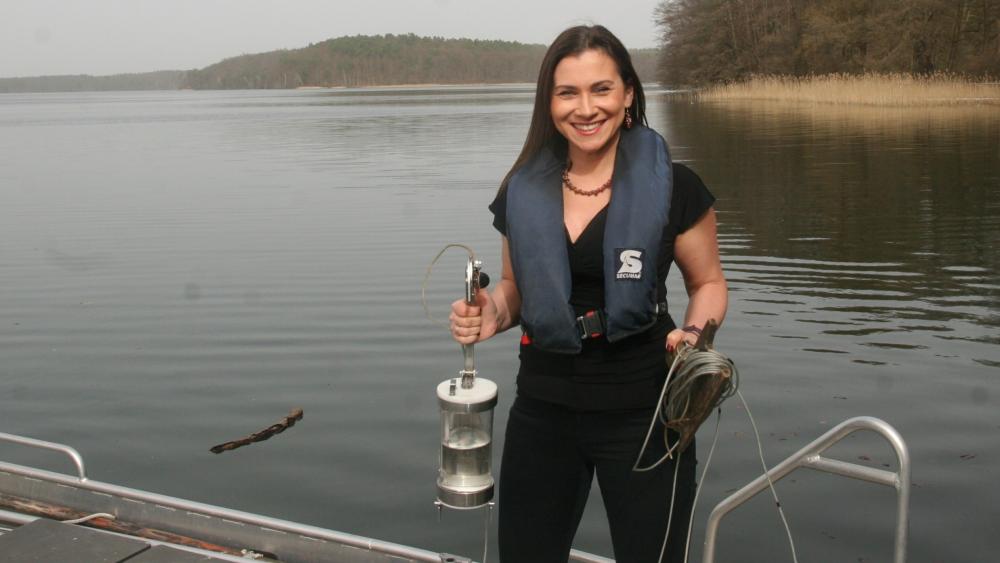
Prof. Mina Bizic at Lake Stechlin | Photo: private
Ms. Bizic, congratulations on your new professorship at TU Berlin. What are your thoughts on your new position?
It has been a long and challenging journey. I have been preparing for this step for a very long time. In fact, I've been working towards it for most of my life. That's why I'm incredibly happy to have made the leap from a project-funded researcher to a professor at a university. And even in the dual-career model, because my partner has also accepted a position at TU Berlin.
What are you most looking forward to?
I'm really looking forward to the teaching part. I haven't had much of an opportunity to do that before. I love teaching and interacting with students.
And I will have a wonderful chance to combine my old academic home with my new one: My first own course at the university will have its practical part at IGB. In fact, the practical part always took place somewhere else, but now, I want my students to get to know IGB with its manifold methods and infrastructure and its fascinating researchers.
The chair you now hold at the TU Berlin is called "Environmental Microbiomics". So, you are staying true to your subject, the study of the smallest living organisms?
Yes, exactly, I am still concentrating on microorganisms, i.e. bacteria, viruses, fungi, and phytoplankton, i.e. algae and Cyanobacteria. And especially the microorganisms that live in water: Lakes, marine systems, and now also caves. The Chair used to be called "Environmental Microbiology“. The new term "Microbiomics" makes clear that new molecular techniques are a main approach. And that the focus is on interactions and communities more than individual organisms.
What fascinates you about microorganisms?
Microorganisms are everywhere, even in the smallest drop of water. Although they are so tiny, their vast numbers are responsible for many important processes in our environment, in food webs, and in the carbon cycle. They therefore play a role in climate change and adaptation.
And from a human perspective, this role can be ambivalent – it can be good or bad. Let's take phytoplankton for example: it can fix carbon but also release methane. I am very interested in the balance between these processes. And yes, as we all know, microorganisms can make us sick, but they can also produce beer, cheese, and wine and make sure that we can use them as food in our intestines. Aside from the anthropocentric view, they are just incredibly exciting as tiny units of life with very individual, cool characteristics and adaptation mechanisms.
Since you mentioned caves earlier, have you ever studied microorganisms in caves? What is special about them?
I have studied microorganisms in the Movile Cave in Romania, which has been isolated from the outside world and the atmosphere for five million years. I was one of the few people to enter the cave. It is characterized by a unique groundwater ecosystem that is rich in hydrogen sulfide and carbon dioxide, but poor in oxygen. Life in the cave relies entirely on chemosynthesis rather than photosynthesis. In this unique food web, the bacteria play a crucial role in the nitrogen and sulfur cycles. As I said, they are just cool creatures!
You mentioned earlier that the career path is long and requires a lot of confidence and perseverance. What important steps can you give young scientists to take along the way?
I can only speak for myself, but the Leibniz Mentoring Program, for example, has helped me immensely. Networks are generally important, but in this career phase, women-specific networks are even more crucial, as there may not yet be many female role models within your own community. I would definitely like to continue my involvement with Leibniz Mentoring, but this time as a mentor. I have had such positive experiences that I want to pass them on. So, my message of encouragement is this: Let your passion for science guide you even when the journey gets dark and bumpy. Stay connected, seek support from your scientific society, and never give up on your dreams!
Dear Ms. Bizic, thank you for the interview. We wish you much joy and success in your new position.






